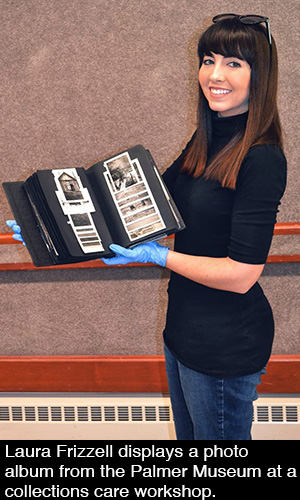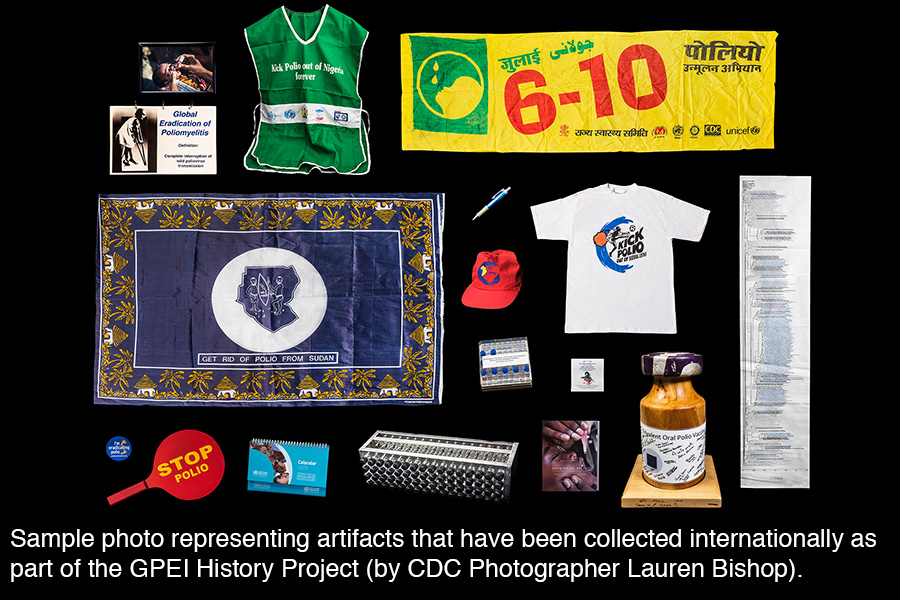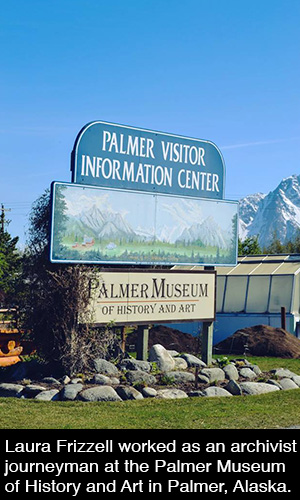Alumni Q&A: Laura Frizzell, from Coca-Cola Archives to the CDC
 October is National Archives Month, and we’ll be running a series of articles celebrating the importance of this area of information sciences. “National Archives Month is an opportunity for us all to think about the importance of archives and archival collecting in our world of information. Archivists collect, arrange, describe, and preserve documents that reflect every aspect of our lives, from our work time to our recreation time, our families, friends, and neighborhoods. For me, being an archivist means looking deeply into the experience of human life and finding what stories need to be kept, nurtured, and shared with future generations. When I teach Introduction to Archives and Records Management, I have a chance to share that passion with the next generation of archivists, and am delighted to find the same passion for keeping and sharing stories in others!”- Emil Hoelter, information sciences lecturer at the University of Tennessee, Knoxville.
October is National Archives Month, and we’ll be running a series of articles celebrating the importance of this area of information sciences. “National Archives Month is an opportunity for us all to think about the importance of archives and archival collecting in our world of information. Archivists collect, arrange, describe, and preserve documents that reflect every aspect of our lives, from our work time to our recreation time, our families, friends, and neighborhoods. For me, being an archivist means looking deeply into the experience of human life and finding what stories need to be kept, nurtured, and shared with future generations. When I teach Introduction to Archives and Records Management, I have a chance to share that passion with the next generation of archivists, and am delighted to find the same passion for keeping and sharing stories in others!”- Emil Hoelter, information sciences lecturer at the University of Tennessee, Knoxville.
What does your current job entail?
Currently, I’m the Archivist for the Global Polio Eradication Initiative (GPEI) History Project, based at the David J. Sencer CDC Museum. GPEI is a partnership consisting of the World Health Organization, Rotary International, the CDC, UNICEF, and the Gates Foundation that seeks to eradicate polio worldwide. The GPEI History Project works to ensure the preservation of materials that reflect this global effort.
As such, my job entails working with archivists at the partner archives to represent and strengthen their polio collections; collect and determine a preservation solution for born-digital records produced by the GPEI Management Structure; and collect and preserve materials (especially 3D artifacts!) from GPEI personnel. This job requires me to be 25% liaison, 50% archivist, and 25% curator. And while this is definitely a challenging mix, I’ve been very lucky to travel as part of this position (I’ll be going to Cameroon in November!) and earn my stripes in a way that feels unique and rewarding.
What excites you most about your job and your field?
With my current position, it’s been really exciting to work so closely with donors. I love hearing the fascinating stories behind the materials they’re donating to the GPEI History Project, and I’m always humbled by the trust they put in me, the CDC Museum, and the other partner archives to care for these items long-term. In the near future, I’m looking forward to finding ways to share some of these artifacts with the public.
 The most exciting thing about being an archivist, for me, is the opportunity it affords to learn so much about so many different things. Because archival collections vary greatly per project or repository, an archivist is constantly being asked to dig in and become more knowledgeable about the subjects at hand. In my case, I’ve gone from working with Civil War manuscripts to Coca-Cola history, then Alaska heritage, and now polio eradication. I wouldn’t consider myself an expert on any of these things per se, but I definitely know more now than I did beforehand, and that’s exciting to me.
The most exciting thing about being an archivist, for me, is the opportunity it affords to learn so much about so many different things. Because archival collections vary greatly per project or repository, an archivist is constantly being asked to dig in and become more knowledgeable about the subjects at hand. In my case, I’ve gone from working with Civil War manuscripts to Coca-Cola history, then Alaska heritage, and now polio eradication. I wouldn’t consider myself an expert on any of these things per se, but I definitely know more now than I did beforehand, and that’s exciting to me.
When you were getting your Information Sciences degree, did you envision working in the types of jobs you have held thus far? How did the opportunities open up for you?
As a student, I just wanted to believe that I would be able to find any job when I graduated! Graduating with my degree helped me see that, between my courses and internships, my foundation was stronger than I realized. I knew that I wanted to be an archivist even before joining the graduate program, but my education and internship experiences helped me get a better feel for what that would actually entail and how I could make the role more reflective of my strengths and interests.
Having my degree has opened so many doors for me because of the necessity of having it while job hunting. Since graduating, I have learned a great deal about different types of archives, how they function, and how the core principles I learned in my Archives and Records Management course are present in each. Knowing this, I like to think that my options are much broader than I could have imagined before graduate school, and I continue to be pleasantly surprised by the opportunities that appear.
Why should students consider getting an Information Sciences degree?
As someone who wanted to be an archivist, there were a few graduate degrees I could have earned that would have theoretically prepared me to do that. Ultimately, I chose the Information Sciences degree because I liked the idea of getting an education that was more representative of the many facets of the larger information sciences field, not just one part of it. I was able to fine-tune my career goals and interests with the internships I pursued while my education helped me expand my focus. As a result, I have a better understanding of both libraries and archives – their differences and the ways they are complementary.
What misconceptions do people who are not in the field have about Information Sciences, and how do you explain what you do to them?
When people think about archives, many times they think of dark, dusty places with a bunch of old papers sitting around. While there can certainly be dust and old papers, I always love explaining that archives can be so much more by using the archives of the Coca-Cola Company and the GPEI History Project as examples and talking about some of the artifacts held by each – from famous artwork to vaccine vials. Archival materials can be so engaging and visual, and, in that way, fantastic for telling stories and helping researchers or visitors make memorable connections. This is an experience that goes well beyond skimming a stack of dusty papers, and moments like this can happen in any archives.
A classic misconception about the Information Sciences degree is that it’s unnecessary. “You need a master’s degree for that?!” is a line that’s no stranger to someone in this line of work. At that point, I usually like to point to the intricacy of cataloging or the complexity of caring for archival materials pertaining to a specific race or culture to highlight why this work requires more than on-the-job training.
What did you do in Alaska as a Journeyman Archivist last summer?
As part of Alaska’s Journeyman Archival Processing Program, I was able to spend six weeks in Palmer, Alaska providing archival instruction for staff at the Palmer Museum of Art and History. As many know, Alaska is an extraordinary but isolated place and it can be hard to find people there with experience in specialized fields, i.e. archivists. But that doesn’t mean there aren’t a ton of great archives and museums all over the state. To help strengthen these collections, the state hires two people every year to come do some sort of archival work (processing, digitization, etc.) and leave behind some examples of good practice. I was lucky to be chosen as one of these archivists, and my work entailed processing two collections, creating two finding aids, advising on preservation measures, and co-leading a community workshop on preservation in the home. This continues to be the gem of my professional experience, and I would encourage anyone working from one contract to the next (as I usually do) to get adventurous.
Can you sum up what you did when you worked at Coca-Cola?
Working in the archives of the Coca-Cola Company was my first full-time experience after graduate school, and it was exactly what I needed. As a Project Archivist there, I essentially got to try my hand at processing and cataloging several different types of collections – from booklets and documents to 3D artifacts and original artwork used in advertising. At that time, my experience was already pretty varied, so it was interesting to see how corporate archives compared to those in museums, universities, state institutions, etc. All in all, it was a very eye-opening 18-month position that prepared me for my time in Alaska and my current position. And I’m pretty sure no matter how long my resume gets, it will always be the first place people ask about, which is a real testament to the company’s legacy.
Do you have specific goals for your career – if so, how do you plan to achieve those goals?
I’ve been very lucky so far to have the career that I do, and each position has helped me better understand my strengths and what makes me happy in a job. Going forward, I’m hoping that I will continue to find positions that challenge and excite me. Right now, I’m looking to stick to what I know, which is to say museum or corporate archives, but you never know which position will come your way and feel just right. To continue building a name for myself in the field, I stay involved in local archivist organizations such as the Society of Georgia Archivists, attend workshops, and later this year my colleagues and I will be presenting at two international conferences. It pays to stay active in the field apart from just going to work every day, and I would definitely suggest it for any new graduate.